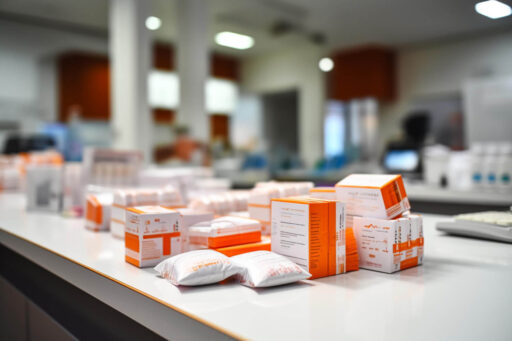If you're here, you're probably wondering what that GMP acronym you see so often in the pharmaceutical industry stands for. Don't worry, you're in the right place to unravel that mystery! In this article, we are going to expand our knowledge of Good Manufacturing Practices, better known as GMP, and explore its importance, standards and validation process in the pharmaceutical field.
GMP IN PHARMACY: QUALITY AND SAFETY IN MEDICINES
by marketing on 10 de June de 2024
WHAT DOES GMP MEAN IN THE PHARMACEUTICAL INDUSTRY?
WHAT IS GMP IN PHARMACY AND WHY IS IT IMPORTANT?
First things first, what does GMP actually mean? Well, for starters, GMP stands for Good Manufacturing Practices, which in English translates to Good Manufacturing Practices. Now, why should you care about GMP in the pharmaceutical industry? Because it is crucial to ensure the quality, safety and efficacy of the pharmaceutical products you get your hands on!
ENSURES PATIENT SAFETY
One of the most important reasons why Good Manufacturing Practices are vital in the pharmaceutical industry is because they ensure patient safety. Imagine for a moment that the medicines you consume are not manufactured to rigorous standards. This could mean that they might contain dangerous impurities or not be composed of the right ingredients in the right doses. GMP standards ensure that medicines are manufactured in controlled and safe environments, thereby reducing the risk of adverse effects on patients.
QUALITY OF THE PRODUCT
Another crucial aspect is the quality of the product. Medicines must be consistent in their composition and effectiveness. GMP standards establish processes to ensure that each batch of medicines produced meets specified quality standards. This is achieved through strict control of raw materials, monitoring of manufacturing processes and thorough quality testing.

REGULATORY COMPLIANCE
Regulatory agencies, such as the FDA and EMA, impose strict compliance requirements on pharmaceutical companies. Complying with GMP standards is critical to ensure that companies meet these regulatory requirements. Failure to comply can result in severe penalties, including product recalls or prohibition from operating.

CONSUMER CONFIDENCE
When a patient takes a medicine, he or she trusts that it will provide relief and improve his or her health. GMP standards play a key role in building and maintaining this consumer confidence. By demonstrating a commitment to quality and safety through GMP compliance, pharmaceutical companies can earn the trust of patients and maintain their reputation in the marketplace.
INNOVATION AND SCIENTIFIC PROGRESS
Compliance with GMP standards also fosters innovation and scientific progress in the pharmaceutical industry. By setting standards for quality and safety, GMP provides a solid framework for research and development of new medicines. This allows pharmaceutical companies to focus on creating innovative treatments that improve the health and well-being of people around the world.
In short, Good Manufacturing Practices (GMP) are fundamental to ensuring the safety, quality and efficacy of medicines in the pharmaceutical industry. From protecting patient health to fostering innovation, compliance with GMP standards is essential to the safe and effective operation of the pharmaceutical sector.
GMP STANDARDS IN PHARMACY: WHAT DO THE RULES DICTATE?
WHAT DO THE GMP STANDARDS INCLUDE?
GMP standards set out a series of guidelines and requirements that pharmaceutical companies must follow during the manufacturing process of medicines. These guidelines cover areas such as quality of personnel, facilities, equipment, quality control, documentation and much more.
WHO SETS THE GMP STANDARDS?
GMP standards are set by national and international regulatory bodies, such as the US Food and Drug Administration (FDA) and the European Medicines Agency (EMA).
HOW TO COMPLY WITH GMP STANDARDS?
Complying with GMP standards involves implementing appropriate systems and procedures at all stages of medicine manufacturing. This includes everything from personnel selection and training to facility and equipment maintenance, raw material control, process monitoring and quality testing.
GMP VALIDATION IN PHARMACY: WHY IS IT NECESSARY?
Good Manufacturing Practice (GMP) validation in the pharmaceutical industry is a fundamental process that plays a crucial role in ensuring the quality and safety of pharmaceutical products. Let's now take a closer look at why this validation is so necessary and how it benefits both manufacturers and patients.

CONFIRMATION OF COMPLIANCE WITH GMP STANDARDS
GMP validation confirms that the systems, equipment and processes used in the manufacture of medicines meet the rigorous standards set by GMP regulations. This is essential to ensure that the medicines produced are safe, effective and of high quality.

REDUCTION OF THE RISK OF ERRORS AND DEFECTS
By validating systems and processes, the risk of errors and defects in the manufacture of medicines is significantly reduced. This includes human error, equipment failure and procedural deviations. By identifying and addressing these risks during the validation process, you ensure consistency and reliability in medicine production.
ENSURING CONSISTENT AND REPRODUCIBLE RESULTS
GMP validation ensures that the results obtained during the manufacture of medicines are consistent and reproducible. This means that each batch of medicines produced will meet the same standards of quality and efficacy, regardless of when or where it is produced. This consistency is fundamental to the safety and efficacy of medicines.
COMPLIANCE WITH REGULATORY REQUIREMENTS
Regulators require pharmaceutical companies to validate their systems and processes to demonstrate compliance with GMP standards. GMP validation is a legal and regulatory requirement in many jurisdictions, and non-compliance can lead to severe penalties, including product recalls.
CONTINUOUS IMPROVEMENT AND PROCESS OPTIMISATION
GMP validation is not a one-off event, but a continuous process. As technologies and best practices change, manufacturing systems and processes need to be regularly reviewed and updated. Continuous validation allows pharmaceutical companies to identify opportunities for improvement and optimisation in their operations, leading to greater efficiency and quality in the production of medicines.

